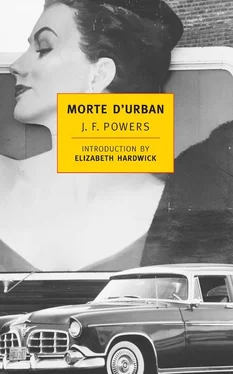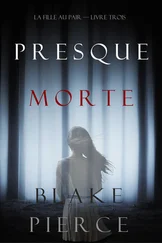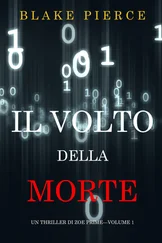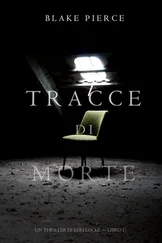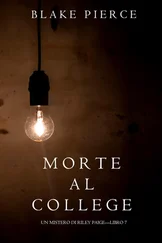“The chances are she took the wallets out when she cleaned his pants,” Father Urban said to Wilf.
“I just can’t believe they’re lost,” Jack said.
“We don’t have a thing to worry about,” Father Urban said, again to Wilf.
“A phone call to Father Chmielewski will tell us that,” said Wilf, rather ominously. “I never carry my wallet in my back pocket. There’s too much chance of it riding up when you sit down. Lots of wallets are lost that way.”
Jack looked miserable. “I always keep my back pocket buttoned,” he said, but this didn’t count for much coming from him just then, as he must have realized.
“Oh Lord!” Once again, as frequently happened on their little trips, Wilf explored the problem he had with the Minnesota Central. He had written what he considered a very nice letter to the president of the road, requesting another pass, but for some reason he had received no reply — none at all. Six, seven weeks now, had gone by since he had written, and each one of those weeks meant sixty-five cents for a round-trip ticket, which might not seem like very much, but over a long period of time it really mounted up. If they were entitled to two passes, why weren’t they entitled to three? They weren’t joyriding on them. They were serving the same people — a lot of them anyway — that the Minnesota Central was serving. Naturally, Wilf hadn’t put any of this in his letter. He had just written a very nice letter — the kind of letter you’d think would at least be answered. “Oh Lord!”
Father Urban sighed. He had said all he had to say on this subject several weeks ago — that Wilf might drop a line to Father Louis, since he was responsible for the two passes they had — but Wilf hadn’t responded to this suggestion at all, perhaps because he thought it reflected on him as a good provider.
The train slowed down and came to rest between two corn fields. Such unscheduled stops were a mysterious feature of travel on the Minnesota Central. Sometimes a fast freight would rattle by, but usually there was no explanation — the engineer who had set traps along the way, and had stopped the train in order to service them, was now retired, Wilf understood.
“Of course, anything can happen during the Christmas rush,” he said. “I’m always reading about cards and letters being delivered twenty years or more after they were mailed. Still, this may be the man’s way of saying no. I’m not overlooking that possibility.”
In Father Urban’s opinion, this was more than just a possibility. “You’d be wise not to write again,” he said.
“But now I may have to! As things stand now, we’re down to one pass!”
Jack looked miserable. “Now we’re moving,” he said, but he was wrong. They had moved, but they weren’t moving.
“I don’t think we have a thing to worry about — where Jack’s pass is concerned,” said Father Urban.
“I hope you’re right,” Wilf said. “And who knows? We may hear something about the other one pretty soon. Maybe even tomorrow, or the next day.”
“Or the day after.”
“Yes, that’s more like it.” Wilf was taking the holidays into consideration.
“ Now we’re moving,” Jack said, and this time they really were.
Father Urban, having done what he could for Jack with Wilf, now went to bat for himself. “Phil Smith’s talking about Florida. Phil and Monsignor Renton.”
“They went last year,” Wilf said.
“I understand you let Louis fill in at St Monica’s last year…”
“Things are different this year. This year I need every man I’ve got.” Wilf thought this over, and then he went on. “To tell you the truth, I was glad to get rid of Louis for a while. He was cold all the time — or said he was — and he wasn’t here for the worst part. I know Louis is a friend of yours, Urban, but I’m afraid he’s not much of a team man.”
“I thought if I went to St Monica’s I might be able to stimulate interest in the Hill, recruit retreatants, accept speaking engagements, make contacts…” Yes, and live and work as a priest .
“I don’t say you wouldn’t be able to help us there, but you’re needed where you are — and don’t forget the brochure.”
“I’m not.”
“In fact, you’d better tell Phil not to count on you for weekends after Lent begins. No, don’t say anything about that. We’ll wait awhile and see how it goes.”
“Poor Phil,” said Father Urban. Phil, and Phil alone among the diocesan clergy, had given Wilf a hand when he most needed it, the previous winter, and Wilf had said that he’d never forget it. He had since found out, though, that Phil was out of favor at the Chancery. Father Urban tried another angle. “I was more or less under the impression that I’d be able to go there, and so this only came up as an outside possibility, but maybe I’d better mention it — now rather than later.”
“What’s this?”
“Renton thinks Phil can get somebody else, if need be. Maybe a Jesuit, he said.” This was something Monsignor Renton had mentioned in passing, with Wilf in mind, Father Urban suspected, but still it had been said.
“Well, that’s a chance I’m willing to take,” Wilf said. He was irrational on the subject of Jesuits, but not irrational enough to believe that they’d make the mistake of helping a man in Phil’s position.
“I just thought I’d better mention it,” Father Urban said, and with that he despaired. He had appealed to Wilf’s common sense— it should have told him that Father Urban could best serve the interests of the Order and the Hill by going to St Monica’s. He had appealed to Wilf’s sense of loyalty— it should have made him want to help Phil Smith. He had appealed to Wilf’s fear of Jesuits— it was perhaps his greatest fear. Father Urban couldn’t see why these considerations, all together, shouldn’t override Wilf’s desire to employ him as a common workman. Wilf made so little sense, in fact, that Father Urban wondered if he might not be acting under instructions from Chicago to keep the star of the Order blacked out.
Brother Harold was waiting for them at the station in Duesterhaus. Wilf, Jack, and Father Urban packed themselves into the cab of the pickup truck, with Wilf at the wheel, and Brother Harold climbed into the back end and crouched behind the cab.
“O.K.!” he yelled.
“We’ll have to do something about that,” Wilf said. It was a cold day, growing colder, with dust blowing in from North Dakota.
“You mean get some straw for him?” said Father Urban, as they pulled away.
“As a matter of fact,” Wilf replied, sounding hurt, “I was thinking of canvas. Kind of expensive, though.”
For the life of him, Father Urban couldn’t see how the Catholic Church (among large corporations) could be rated second only to Standard Oil in efficiency, as Time had reported a few years back.
When they got back to the Hill, Father Urban picked up his mail, and a box he’d been expecting, and headed for his room where he meant to lie down and rest. On the stairs, he turned and caught a glimpse of Wilf and Jack in the office — of Wilf handing the telephone to Jack. After delivering the mail and the box (which contained an electric heater) to his room, Father Urban put on the heavy sweater he wore around the house and went downstairs. He was thinking Jack might need someone to defend him.
Wilf was in possession of the telephone, was saying good-bye, hanging up. Apparently he hadn’t trusted Jack to do the talking, after all. “I don’t know what Father Chmielewski must think of us here!” he said to Father Urban. “I’ve never been so embarrassed in my life!” And then to Jack: “Both wallets where you left them! Don’t you see what this means?”
Читать дальше
